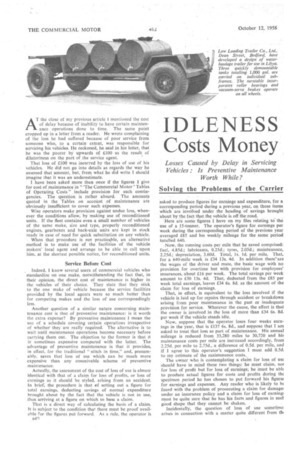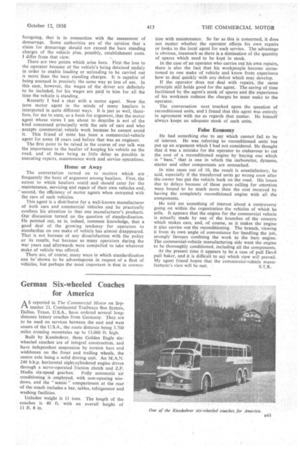IDLENESS Costs Money
Page 74

Page 77

If you've noticed an error in this article please click here to report it so we can fix it.
Losses Caused by Delay in Servicing Vehicles : Is Preventive Maintenance Worth While?
Solving the Problems of the Carrier
AT the close of my previous article I mentioned the cost of delay because of inability to have certain maintenance operations done to time The same point cropped up in a letter from a reader. He wrote complaining of the loss he had suffered because of poor service from someone who, to a certain extent, was responsible for servicing his vehicles. He reckoned, he said in his letter, that he was the poorer by upwards of £100 as the result of dilatoriness on the part of the service agent.
That loss of £100 was incurred by the loss of use of his vehicles. He did not go into details as regards the way he assessed that amount, but, from what he did write I should imagine that it was an underestimate.
I have been asked more than once if the figures 1 give for cost of maintenance in "'The Commercial Motor ' Tables of Operating Costs" include provision for such contingencies. The question is rather absurd. The amounts quoted in the Tables on account of maintenance are obviously insufficient to cover such expenses.
Wise operators make provision against undue loss, whenever the conditions allow, by making use of reconditioned units. If the fleet contains even a small number of vehicles of the same make, size and type, properly reconditioned engines, gearboxes and back-axle units are kept in stock ready in case of need for quick substitution on any vehicle.
When that procedure is not practicable, an alternative method is to make use of the facilities of the vehicle makers' local agent and arrange to be able to call upon him, at the shortest possible notice, for reconditioned units.
Service Before Cost
Indeed, I know several users of commercial vehicles who standardize on one make, notwithstanding the fact that, in their opinion, the direct cost of maintenance is higher in the vehicles of their choice. They state that they stick to the one make of vehicle because the service facilities provided by the local agents were so much better than for competing makes and the loss of use correspondingly less.
Another question of a similar nature concerning maintenance cost is that of preventive maintenance: is it worth the extra expense? By preventive maintenance I mean the use of a schedule covering certain operations irrespective of whether they are really required. The alternative is to wait until maintenance operations become necessary before carrying them out. The objection to the former is that it is sometimes expensive compared with the latter. The advantage of preventive maintenance is that it provides, in effect, for the traditional " stitch in time," and, presumably, saves that loss of use which can be much more expensive than any conceivable scheme of preventive maintenance.
Actually, the assessment of the cost of loss of use is almost identical with that of a claim for loss of profits, or loss of earnings as it should be styled, arising from an accident. In brief; the procedure is that of setting out a figure for total earnings, deducting savings of normal expenditure brought about by the fact that the vehicle is not in use, thus arriving at a figure on which to base a claim.
That is a direct way of calculating the basis of a claim. It is subject to the condition that there must be proof available for the figures put forward. As a rule, the operator is a41
asked to produce figures for earnings and expenditure, for a corresponding period during a previous year, on those items which are involved under the heading of savings brought about by-the fact that the vehicle is off the road.
Here are some figures I have on my files relating to the use of a 15-tonner. The operator's figure for earnings per week during the corresponding period of the previous year averaged £85 and his weekly mileage for the same period totalled 640.
Now, the running costs per mile that he saved comprised: fuel, 4.85d.; lubricants, 0.25d.; tyres, 2.05d.; maintenance, 2.25d.; depreciation, 3.60d, Total, Is. Id. per mile. That, for a 640-mile week is £34 13s. 4d. In addition there'are the wages of the driver and mate, the basic wage with no provision for overtime but with provision for employees' insurances, about £16 per week. The total savings per week amount to £50 13s. 4d. That, deducted from the £85 per week total earnings, leaves £34 6s. 8d, as the amount of the claim for loss of earnings.
That, in effect, is equivalent to the loss involved if the vehicle is laid up for repairs through accident or breakdown arising from poor maintenance in the past or inadequate provision for service. Whatever the cause, the effect is that the owner is involved in the loss of more than £34 6s. 8d. per week if the vehicle stands idle.
Now, suppose that the operator loses four weeks earnings in the year, that is £137 6s. 8d., and suppose that I am asked to treat that loss as part of maintenance. His annual mileage is reduced from 33,280 miles to 30,720 and his maintenance costs per mile are increased accordingly, from 2.25d. per mile to 2.75d., a difference of 0.5d. per mile, and If I agree to this operator's suggestion I must add 0.5d. to my estimate of the maintenance costs.
The owner who is contemplating a claim for loss of use should have in mind these two things: he must claim, no for loss of profit but for loss of earnings; he inust be able to produee actual figures for costs and profits during the specimen period he has chosen to put forward his figures for earnings and expenses. Any reader who is likely to be faced with the problem of prosecuting a claim for damage under an insurance policy and a claim for loss of earning must be quite sure that he has his facts and figures in suet good shape that they cannot be shaken. Incidentally, the question of loss of use sometime: arises in connection with a matter quite different from th, foregoing, that is in connection with the assessment of demurrage. Some authorities are of the opinion that a claim for demurrage should not exceed the bare standing charges of the vehicle plus, possibly, establishment costs.
differ from that view.
There are two points which arise here. First the loss to the operator because of the vehicle's being detained unduly in order to enable loading or unloading to be carried out is more than the bare standing charges. It is capable of being assessed in precisely the same way as loss of use. In this case, however, the wages of the driver are definitely to be included, for his wages are paid to him for all the time the vehicle is standing., Recently I had a chat with a motor agent. Now the term motor agent in the minds of many hauliers is interpreted in quite different ways. It is just as well, therefore, for me to state, as a basis for argument, that the motor agent whose views I am about to describe is not of the kind concerned principally with the sale of cars and who accepts commercial vehicle work because he cannot avoid it. This friend of mine has been a commercial-vehicle agent for some 18 years and before that was an engineer.
The first point to be raised in the course of our talk was the importance to the haulier of keeping his vehicle on the road, and of then being as little delay as possible in executing repairs, maintenance work and service operations.
Home or Away
The conversation turned on to matters which are frequently the basis of argument among hauliers. First, the extent to which hauliers could and should cater for the maintenance, servicing and repair of their own vehicles and, — second, the efficiency of motor agents when entrusted with the care of such vehicles.
This agent is a distributor for a well-known manufacturer of both cars and commercial vehicles and he practically confines his attention to that one manufacturer's products. Our discussion turned on the question of standardization. He pointed out, as is, indeed, Common knowledge, that a good deal of the growing tendencyfor operators to standardize on one make of vehicle has almost disappeared. That is not because of any dissatisfaction with the policy or its results, hut because so many operators during the war years and afterwards were compelled to take whatever make of vehicle was offered.
There are, of course, many ways in which standardization can be' shown to be advantageous in respect of a fleet of vehicles, but perhaps the most important is that in connee tion with maintenance. So far as this is concerned, it does not matter whether the operator effects his own repairs or looks to the local agent for such service. The advantage is obvious, inasmuch as there is a diminution of the quantity of spares which need to be kept in stock.
In the case of an operator who carries out his own repairs, there is also the fact that his workpeople become accustomed to one make of vehicle and know from experience how to deal quickly with any defect which may develop.
If the operator does not deal with repairs, the same principle still holds good for the agent. The saving of time facilitated by the agent's stock of spares arid the experience of his workmen reduces the charges he must make to the operator.
The conversation next touched upon the question of reconditioned units, and I found that this agent was entirely in agreement with me as regards that matter. He himself always keeps an adequate stock of such units.
False Economy
He had something else to say which cannot fail to be of interest. He was referring to reconditioned units but put up an argument which I had not considered. He thought that it was a mistake for the operator to endeavour to cut the cost of a reconditioned engine by buying one which is "bare," that is one in which the carburetter, dynamo, starter and other components are untouched.
In nine cases out of 10, the result is unsatisfactory, he said, especially if the transferred units go wrong soon after the owner has put the vehicle back on the road. His losses due to delays because of these parts calling for attention were bound to be much• more than the cost incurred by having the completely reconditioned engine with all . the components.
He told me something of interest 'about a controversy going on within the organization the vehicles of which he sells. It appears that the engine for the commercial vehicle is actually made by one of the branches of the concern which makes cars, and, of course, as it makes the engine it also carries out the reconditioning. The branch, viewing it from its own angle of convenience for handling the job, strongly favours confining the work to the bare engine. The commercial-vehicle manufacturing side want the engine to be thoroughly conditioned, including all the components.
At the present time it appears to be a case of pull Devil pull baker, and it is difficult to say which view will prevail. My agent friend hopes that the commercial-vehicle manu facturer's view will be met. S.T.R.




















































































































